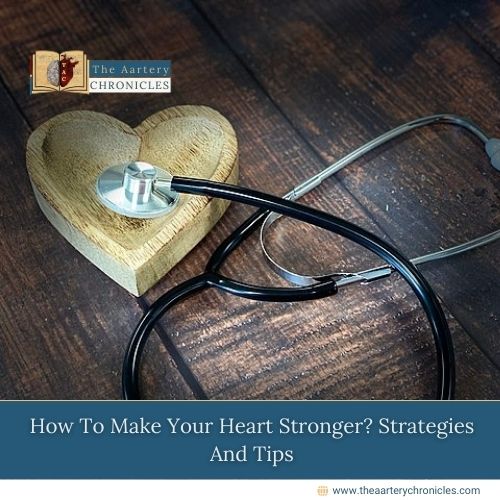

How To Make Your Heart Stronger? Strategies And Tips
Introduction
How to make your heart stronger? The heart is one of the most important organs in the body, and keeping it strong is essential for a long and healthy life. Strengthening your heart means improving its ability to pump blood effectively, reducing the risk of cardiovascular disease, and improving your overall well-being. Here’s how you can take care of your heart and make it stronger.
Causes Of Fatigue During Pregnancy
1. Practice Regular Physical Activity
Exercise is one of the most effective ways to strengthen your heart, improve circulation, and lower blood pressure.
Useful Types Of Exercise:
✔️Aerobic exercises (cardio):
- Brisk walking, light jogging, cycling, swimming.
- Benefits: Improve cardiovascular endurance and heart efficiency.
✔️Strength training:
- Exercises with light weights or free body.
- Benefits: Strengthens muscles, improving blood circulation.
✔️Flexibility and relaxation activities:
- Yoga or pilates.
- Benefits: Reduced stress and improved vascular health.
Tip: Spend at least 150 minutes a week on moderate physical activity or 75 minutes on vigorous exercise.
2. Eat A Heart-Healthy Diet
A balanced diet is essential to keep your heart healthy.
Foods That Strengthen The Heart:
- Healthy fats: Extra virgin olive oil, avocado, oily fish (salmon, mackerel).
- Vegetables and Fruits: Rich in vitamins, antioxidants, and fibers
- Whole grains: Brown rice, oats, spelt.
- Legumes: Lentils, beans, chickpeas.
- Seeds and Nuts: Flax seeds, chia seeds, walnuts, and Almonds.
- Dark chocolate (min. 70%): Improves circulation thanks to flavonoids.
What To Avoid:
- Foods rich in salt and saturated fats (salty snacks, sausages).
- Refined sugars (industrial sweets, carbonated drinks).
- Trans fats (margarines, packaged products).
Tip: Include foods rich in omega-3s and antioxidants in your diet, which are essential for heart health.
3. Maintain Healthy Body Weight
Being overweight or obese increases the load on your heart and your risk of developing high blood pressure, diabetes, and high cholesterol.
How To Manage Weight:
- Reduce your consumption of empty calories (sugars and saturated fats).
- Eat balanced portions.
- Combine a healthy diet with regular exercise.
Tip: Monitor your weight regularly and aim for a body mass index (BMI) between 18.5 and 24.9.
4. Check Cholesterol And Blood Pressure Levels
High cholesterol and high blood pressure are among the main enemies of the heart.
How To Keep Them Under Control:
- Limit soaked and trans fats in your diet.
- Consume soluble fiber (oats, apples, carrots).
- Your salt intake should be reduced to less than 5g per day.
Tip: Get regular checkups to monitor your blood pressure and cholesterol levels (HDL, LDL, and triglycerides).
5. Manage Stress
Chronic stress can increase blood pressure and the risk of cardiac arrhythmias.
Stress Management Techniques:
- Meditation and mindfulness: They promote mental relaxation.
- Deep breathing: Reduces heart rate and blood pressure.
- Relaxing hobbies: Reading, gardening, music.
Tip: Spend at least 10-15 minutes a day doing relaxation practice.
6. Get Enough Sleep
Quality sleep is essential for heart health.
Benefits Of Sleep:
- Regulates blood pressure.
- Reduces stress levels.
- Improves metabolism and cardiovascular function.
Tip: Aim for 7-8 hours of sleep per night and maintain a regular sleep schedule.
7. Quit Smoking
Smoking is a major cause of cardiovascular disease. It damages blood vessels, increases the risk of atherosclerosis, and accelerates the heart rate.
How To Quit:
- Turn to support programs or drug therapies.
- Also avoid second-hand smoke.
Tip: Reducing or eliminating smoking improves heart health within just a few weeks.
8. Maintain Good Hydration
Water helps maintain blood volume and support heart function.
How Much To Drink:
- Drink at least 1.5-2 liters of water a day.
- Supplement with herbal teas (e.g. ginger, hibiscus) and green tea, which are rich in antioxidants.
Tip: Keep a water bottle handy to serve as a reminder to stay hydrated and swap sugary drinks for antioxidants rich herbal teas.
9. Integrate Cardioprotective Supplements (if necessary)
Some supplements can help strengthen the heart, but they should be taken under medical advice.
Useful Supplements:
- Omega-3: Reduces triglycerides and inflammation.
- Coenzyme Q10: Supports heart cell health.
- Magnesium: Regulates heart rate.
Vitamin D: Contributes to endothelial function.
Summary Table: How To Make Your Heart Stronger
Action | Benefits | Advice |
Physical exercise | Strengthens the heart, improves circulation | 150 minutes of moderate activity per week |
Healthy Eating | Reduces cholesterol, blood pressure and inflammation | Fruit, vegetables, oily fish, cereals |
Weight Management | Reduces the load on the heart | Balanced diet and calorie control |
Blood pressure and cholesterol control | Prevention of heart attacks and strokes | Regular check-ups and salt reduction |
Stress Management | Reduces hypertension and arrhythmias | Meditation, hobbies, deep breathing |
Quality sleep | Regulates blood pressure and stress | Sleep 7-8 hours a night |
Stop smoking | Protects blood vessels | Avoid passive smoking too |
Frequently Asked Questions (FAQ)
1. What is the best exercise for the heart?
☑️Aerobic exercises such as brisk walking, running, swimming, and cycling are especially beneficial for the heart.
2. What foods are best for strengthening the heart?
☑️Oily fish , dried fruit, green leafy vegetables, berries and extra virgin olive oil are excellent for the heart.
3. How long does it take to see improvements?
☑️With a healthy lifestyle, heart benefits can be seen after just a few weeks, such as a reduction in blood pressure or cholesterol.
4. Is chocolate good for the heart?
☑️Yes, dark chocolate (min. 70%) in moderate quantities improves circulation thanks to flavonoids.
5. Can a weak heart be strengthened?
☑️Yes, through lifestyle changes, a healthy diet, and adequate physical activity, it is possible to improve heart function.
Tip: Adopting a healthy lifestyle is the key to strengthening your heart and living better. If you have heart problems, always consult a doctor for a personalized evaluation.









